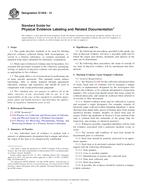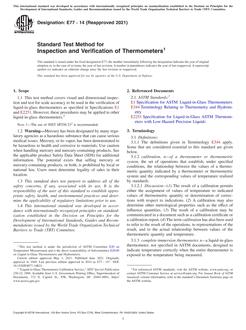1.1 These test methods cover the chemical analysis of magnesium and magnesium alloys having chemical compositions within the following limits:
| Aluminum, % | 0.5 to 12 |
| Copper, % | 0.005 to 0.1 |
| Iron, % | 0.002 to 0.1 |
| Lead, % | 0.001 to 0.5 |
| Manganese, % | 0.01 to 2.0 |
| Nickel, % | 0.0005 to 0.5 |
| Rare earth elements, % | 0.2 to 10 |
| Silicon, % | 0.01 to 0.8 |
| Thorium, % | 0.2 to 25 |
| Tin, % | 0.5 to 10 |
| Zinc, % | 0.3 to 20 |
| Zirconium, % | 0.03 to 1.0 |
| Magnesium, % | remainder |
1.2 The analytical procedures appear in the following order:
| Section | |
| Aluminum: | |
| Benzoate-Oxinate (Gravimetric) Method | 8-15 |
| Sodium Hydroxide (Potentiometric) Method (Optional Routine Method) | 16-23 |
| Copper: | |
| Neocuproine (Photometric) Method | 24-33 |
| Hydrobromic Acid-Phosphoric Acid (Photometric) Method | 34-43 |
| Iron by the 1,10-Phenanthroline (Photometric) Method | 44-53 |
| Lead by the Dithizone (Photometric) Method | 54-63 |
| Magnesium-Analysis for Manganese an Zinc by Direct Current Plasma Spectroscopy (Proposal) | |
| Manganese by the Periodate (Photometric) Method | 64-73 |
| Nickel: | |
| Dimethylglyoxime Extraction (Photometric) Method | 74-83 |
| Dimethylglyoxime (Gravimetric) Method | 84.-91 |
| Rare Earth Elements by the Sebacate-Oxalate (Gravimetric) Method | 92-98 |
| Silicon: | |
| Perchloric Acid (Gravimetric) Method | 99-104 |
| Molybdosilicic Acid (Photometric) Method | 105-114 |
| Thorium by the Benzoate-Oxalate (Gravimetric) Method | 115-121 |
| Tin by the Iodine (Volumetric) Method | 122-129 |
| Zinc: | |
| Ethylenediamine Tetraacetate (Volumetric) Method | 130-137 |
| Potassium Ferrocyanide (Volumetric) Method | 138-144 |
| Zirconium by the Alizarin Red (Photometric) Method | 145-154 |
1.3 This standard does not purport to address all of the safety concerns, if any, associated with its use. It is the responsibility of the user of this standard to establish appropriate safety and health practices and determine the applicability of regulatory limitations prior to use. Specific precautions are given in Section 5.
Product Details
- Published:
- 01/01/2002
- Number of Pages:
- 18
- File Size:
- 1 file , 150 KB


